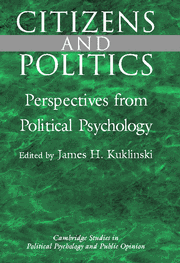Book contents
- Frontmatter
- Contents
- List of Contributors
- Prologue: Political Psychology and the Study of Citizens and Politics
- PART I AFFECT AND EMOTIONS
- Introduction
- 1 The Role of Affect in Symbolic Politics
- 2 Emotions and Politics: The Dynamic Functions of Emotionality
- 3 Cognitive Neuroscience, Emotion, and Leadership
- 4 Emotion as Virtue and Vice
- PART II POLITICAL COGNITION
- PART III POLITICAL ATTITUDES AND PERCEPTIONS
- PART IV POLITICAL VALUES
- Index
- Titles in the series
1 - The Role of Affect in Symbolic Politics
Published online by Cambridge University Press: 07 October 2011
- Frontmatter
- Contents
- List of Contributors
- Prologue: Political Psychology and the Study of Citizens and Politics
- PART I AFFECT AND EMOTIONS
- Introduction
- 1 The Role of Affect in Symbolic Politics
- 2 Emotions and Politics: The Dynamic Functions of Emotionality
- 3 Cognitive Neuroscience, Emotion, and Leadership
- 4 Emotion as Virtue and Vice
- PART II POLITICAL COGNITION
- PART III POLITICAL ATTITUDES AND PERCEPTIONS
- PART IV POLITICAL VALUES
- Index
- Titles in the series
Summary
Humans often are intensely emotionally involved in remote and abstract political events with only modest direct personal costs and benefits. These involvements have energized many of history's most devastating social, political, and religious conflicts. Why such intense emotions are evoked by situations with so little that is tangible and personal at stake has long been a central puzzle for social scientists. This chapter proposes one psychological approach to the problem.
Political symbols often evoke and mobilize human emotions. Virtually every American war has been fought around such rallying symbols. The Boston Tea Party symbolized the colonials' rebellion against British authority. The Confederacy's attack on Fort Sumter and “Remember the Maine!” were the great rallying cries for the Civil War and the Spanish-American War, respectively. The sinking of the Lusitania served the same purpose as America entered World War I and the “sneak attack on Pearl Harbor” for World War II. A less successful effort to create the same kind of rallying symbol was the Tonkin Bay incident in 1965, which succeeded in momentarily mobilizing support for the Vietnam War in Congress but not in the general public. Nonetheless, the Vietnam War had its share of wonderfully symbolic phrases, such as the American officer's statement that “we had to destroy it [a Vietnamese town] to save it,” symbolizing for many the pointlessness of that conflict.
- Type
- Chapter
- Information
- Citizens and PoliticsPerspectives from Political Psychology, pp. 14 - 40Publisher: Cambridge University PressPrint publication year: 2001
- 56
- Cited by



